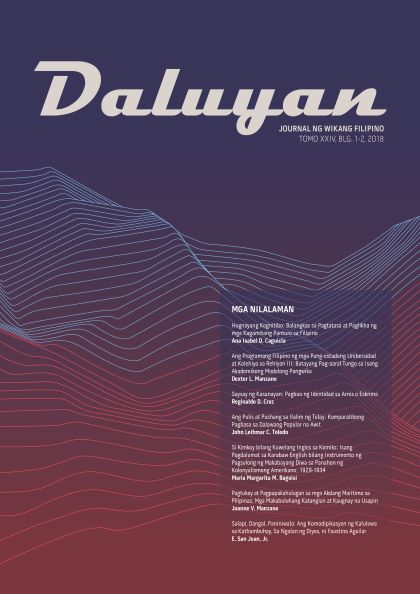SALAPI, DANGAL, PANINIWALA: Ang Komodipikasyon ng Kaluluwa sa Kathambuhay, Sa Ngalan ng Diyos ni Faustino Aguilar
Abstract
Abstrak
Matagumpay na nailarawan ni Faustino Aguilar sa Sa Ngalan ng Diyos ang sitwasyon ng bayan noong dekada 1900-1910. Sa pagkagapi ng rebolusyonaryong Republika, namayani ang oligarkya ng mga burokrata-kapitalista sa ilalim ng imperyong Amerika. Nagkaroon ng puwang ang mga Heswita na ipagpatuloy ang hanapbuhay sa pagsasamantala. Naipit ang anak-pawis at gitnang-uri, walang alternatibo kundi indibidwalistikong pag-aklas. Bagama’t nabigo ng simbahan ang Amerikano sa pagsuyo sa mayamang Filipina, simbolo ng minanang kabihasnan, naisakatuparan sa isang ironikal na bugso ng mga pangyayari ang komodipikasyon ng diwa’t kaluluwa, sa madaya’t tusong estratehiya ng simbahan. Naihimatong sa banghay ng nobela ang posibilidad na ang kontradiksiyon ng lumang gawi at makabagong pananaw ay malulutas sa pagsasabwatan ng kapitalismo’t relihiyon hanggang wala pang kolektibong organisasyong makapipigil sa simabahan at makapagbubuwag sa kolonisadong orden.
Mga Susing Salita: Diyos, Heswita, kontradiksiyon, piyudal, kapitalismo, oligarkya, kolonyalismo, higanti
Abstract
In concentrating a few characters in revealing incidents, Aguilar incisively rendered the country’s dire situation during the first decade of U.S. colonialism, 1900-1910. With the stifling of the revolutionary Malolos Republic, the native oligarchy of bureaucrat-capitalists flourished, patronized by the imperialist administrators. Within this space/period of coopting the subaltern ilustrados, the Jesuit order seized their opportunity to sustain their exploitative practices (interrupted by the U.S. purchase of friar lands). Workers and peasants, together with the tiny petit-bourgeois stratum, suffered without any alternative except by performing individualist gestures of mock refusal or sublimated resistance. While the Jesuits frustrated the Americans (personified by the American suitor) in winning over the rich Filipina heiress, symbol of the inherited wealth and aristocratic culture of the past, the commodification of soul/mind was accomplished here in one ironic turn of events. It transpired in the deceptive, clever strategy for which the Jesuists have been famous in history. We can discern in the plot’s trajectory the possibilities of contradiction between the traditional manners/style of the patriarchal past, the communal ethos, and the modernist world-view. Such contradictions can be resolved by the connivance of the colonial/capitalist managers of the colony and the Roman Catholic church (represented here by the crafty Jesuits). This will continue unless a collective organization of the popular strata (workers, peasants, artisans, professionals) emerges in due time that can restrain the opportunistic religious orders and overthrow the predatory colonial regime.
Keywords: Diyos, Heswita, kontradiksiyon, piyudal, kapitalismo, oligarkya, kolonyalismo, higanti


